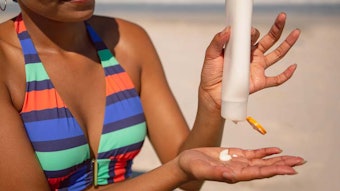The Public Access to Sunscreens (PASS) Coalition launched a campaign to fight the growing skin cancer epidemic in the United States by ensuring Americans have access to the latest effective sunscreens ingredients.
PASS is a multi-stakeholder coalition of health organizations, sun care ingredient suppliers, brand owners, dermatologists and NGOs with a goal to work collaboratively with the U.S. Food and Drug Administration (FDA), other government entities, health care providers and other players in the sun care market to establish a regulatory pathway for timely pre-market review of new, safe and effective sun care ingredients. According to a statement, PASS also is committed to ensuring that the FDA has the resources it needs to conduct the pre-market review of sunscreen time and extent applications (TEAs).
In addition to Beiersdorf and L'Oréal USA, industry players involved in the coalition include suppliers Ashland Inc., BASF Corp., DeWolf Chemical and Fitz Chem Corp..
"America is a leader in innovation and scientific advancement, and yet while advanced sunscreen technology is available globally, it isn’t available in the U.S,” said Al Pearce, senior marketing manager, personal care for BASF Corp.. “The PASS Coalition intends to play an active role in calling on lawmakers and regulators to join forces to provide the public with the most effective and innovative sunscreens available.
"The FDA has acknowledged the process needs to be changed. A clear pathway to change includes working with FDA to identify resource challenges and propose changes based on those challenges—and possibly creating a user fee program from applicants to support the review process."
According to a recent national survey, 85% of Americans use sun care in their daily lives. Furthermore, according to the coalition, 86% of citizens support a program to ensure access to the latest sun care products and technology in the United States.
"In 2010, new clinical research on humans showed more convincingly than ever that sunscreen helps protect against melanoma and other skin cancers," said Shelby Moneer, health educator at the Melanoma Research Foundation.
The 2010 study found that daily sunscreen use reduced the incidence of melanoma, the deadliest form of skin cancer, by half. According to the National Cancer Institute, the estimated total direct cost associated with the treatment of melanoma in the United States in 2010 was nearly $2.4 billion.
"Even though the public is informed better than ever before, many Americans are not aware that the most innovative sun care products are not available to them," said Pearce.
"The focus now includes broad spectrum protection, with UV filters finding their way into virtually all types of cosmetic products," said Anna Gripp, global marketing manager, skin care and sun care, Ashland Inc. "As we increase protection levels, we increase the [levels] of traditional SPF ingredients, which can have a negative impact on a product's sensorial qualities. What we are trying to do as a coalition is facilitate the approval of new UV ingredients. These eliminate the need for more of the traditional ingredients used in sun care that don’t have the great sensorial attributes.
In addition to PASS Coalition members noted above, other current coalition members include: The Skin Cancer Foundation; Prevent Cancer Foundation; Melanoma Research Foundation; Harry Fallick, DO; Henry Lim, MD, Nadim Shaath, PhD; Steven Wang MD; Warwick Morison, MD; and McCullough & Associates.










